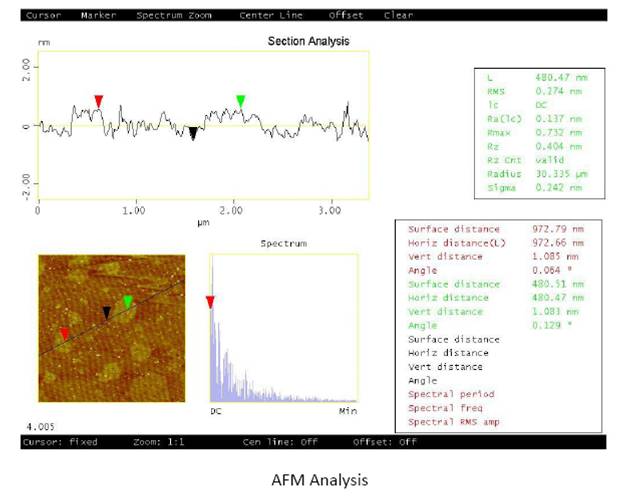Carboxyl Graphene Water Dispersion
As low as
$432.00
$0.00
In stock
SKU# 124
Product Detail
CAS No.: 7782-42-5
Concentration: 5mg/ml. 100ml per bottle (500mg)


Disclaimer: ACS Material LLC believes that the information on our website is accurate and represents the best and most current information available to us. ACS Material makes no representations or warranties either express or implied, regarding the suitability of the material for any purpose or the accuracy of the information listed here. Accordingly, ACS Material will not be responsible for damages resulting from use of or reliance upon this information.
.jpg)
.jpg)
(1).jpg)
Research Citations of ACS Material Products
- Lammel, Tobias, et al. “Internalization and cytotoxicity of graphene oxide and carboxyl graphene nanoplatelets in the human hepatocellular carcinoma cell line Hep G2.” Particle and Fibre Toxicology, vol. 10, no. 1, 2013, p. 27., doi:10.1186/1743-8977-10-27.
- Chu, Bryan, et al. “Graphene-Enhanced Environmentally-Benign Cutting Fluids for High-Performance Micro-Machining Applications.” Journal of Nanoscience and Nanotechnology, vol. 13, no. 8, Jan. 2013, pp. 5500–5504., doi:10.1166/jnn.2013.7538.
- Lammel, Tobias, and José M. Navas. “Graphene nanoplatelets spontaneously translocate into the cytosol and physically interact with cellular organelles in the fish cell line PLHC-1.” Aquatic Toxicology, vol. 150, 2014, pp. 55–65., doi:10.1016/j.aquatox.2014.02.016.
- Lammel, Tobias, et al. “Potentiating effect of graphene nanomaterials on aromatic environmental pollutant-Induced cytochrome P450 1A expression in the topminnow fish hepatoma cell line PLHC-1.” Environmental Toxicology, vol. 30, no. 10, May 2014, pp. 1192–1204., doi:10.1002/tox.21991.
- Liu, Zhenbao, et al. “Intracellular Detection of ATP Using an Aptamer Beacon Covalently Linked to Graphene Oxide Resisting Nonspecific Probe Displacement.” Analytical Chemistry, vol. 86, no. 24, 2014, pp. 12229–12235., doi:10.1021/ac503358m.
- Robertson, Neil M., et al. “Monitoring the Multitask Mechanism of DNase I Activity Using Graphene Nanoassemblies.” Bioconjugate Chemistry, vol. 26, no. 4, Oct. 2015, pp. 735–745., doi:10.1021/acs.bioconjchem.5b00067.
- Balcioglu, Mustafa, et al. “Doxorubicin loading on graphene oxide, iron oxide and gold nanoparticle hybrid.” Journal of Materials Chemistry B, vol. 1, no. 45, 2013, p. 6187., doi:10.1039/c3tb20992j.
- Rana, Muhit, et al. “Nano-Graphene oxide as a novel platform for monitoring the effect of LNA modification on nucleic acid interactions.” The Analyst, vol. 139, no. 4, 2014, pp. 714–720., doi:10.1039/c3an02066e.
- Kaplan, Amir, et al. “Structures Self-Assembled from Anionic Graphene and Cationic Manganese Porphyrin: Characterization and Application in Artificial Photosynthesis.” European Journal of Inorganic Chemistry, vol. 2014, no. 13, 2014, pp. 2288–2295., doi:10.1002/ejic.201400054.
- Balcioglu, Mustafa, et al. “DNA-Length-Dependent Quenching of Fluorescently Labeled Iron Oxide Nanoparticles with Gold, Graphene Oxide and MoS2 Nanostructures.” ACS Applied Materials & Interfaces, vol. 6, no. 15, 2014, pp. 12100–12110., doi:10.1021/am503553h.
- Balcioglu, Mustafa, et al. “Smart-Polymer-Functionalized Graphene Nanodevices for Thermo-Switch-Controlled Biodetection.” ACS Biomaterials Science & Engineering, vol. 1, no. 1, Dec. 2015, pp. 27–36., doi:10.1021/ab500029h.
- Lu, Chang, et al. “Covalent linking DNA to graphene oxide and its comparison with physisorbed probes for Hg 2 detection.” Biosensors and Bioelectronics, vol. 79, 2016, pp. 244–250., doi:10.1016/j.bios.2015.12.043.
- Mauro, Nicolò, et al. “Biotin-Containing Reduced Graphene Oxide-Based Nanosystem as a Multieffect Anticancer Agent: Combining Hyperthermia with Targeted Chemotherapy.” Biomacromolecules, vol. 16, no. 9, May 2015, pp. 2766–2775., doi:10.1021/acs.biomac.5b00705.
- Robertson, Neil M., et al. “Discriminating a Single Nucleotide Difference for Enhanced miRNA Detection Using Tunable Graphene and Oligonucleotide Nanodevices.” Langmuir, vol. 31, no. 36, Feb. 2015, pp. 9943–9952., doi:10.1021/acs.langmuir.5b02026.
- Robertson, Neil M., et al. “Unlocked Nucleic Acids for miRNA detection using two dimensional nano-Graphene oxide.” Biosensors and Bioelectronics, vol. 89, 2017, pp. 551–557., doi:10.1016/j.bios.2016.02.058.
- Lu, Chang, et al. “Comparison of Graphene Oxide and Reduced Graphene Oxide for DNA Adsorption and Sensing.” Langmuir, vol. 32, no. 41, June 2016, pp. 10776–10783., doi:10.1021/acs.langmuir.6b03032.
- Hizir, Mustafa Salih, et al. “Universal sensor array for highly selective system identification using two-Dimensional nanoparticles.” Chemical Science, vol. 8, no. 8, 2017, pp. 5735–5745., doi:10.1039/c7sc01522d.
- Qin, Ailin, et al. “Precipitation of PEG/Carboxyl-Modified Gold Nanoparticles with Magnesium Pyrophosphate: A New Platform for Real-Time Monitoring of Loop-Mediated Isothermal Amplification.” ACS Applied Materials & Interfaces, vol. 9, no. 12, 2017, pp. 10472–10480., doi:10.1021/acsami.7b00046.
- Mehmeti, Valbonë, and Fetah I. Podvorica. "Experimental and Theoretical Studies on Corrosion Inhibition of Niobium and Tantalum Surfaces by Carboxylated Graphene Oxide." Materials 11, no. 6 (2018): 893.
- Hizir, Mustafa Salih, Nidhi Nandu, and Mehmet V. Yigit. "Homologous miRNA analyses using a combinatorial nanosensor array with two-dimensional nanoparticles." Analytical chemistry 90, no. 10 (2018): 6300-6306.
- Nandu, Nidhi, Mustafa Salih Hizir, and Mehmet V. Yigit. "Systematic investigation of two-dimensional DNA nanoassemblies for construction of a nonspecific sensor array." Langmuir 34, no. 49 (2018): 14983-14992.
